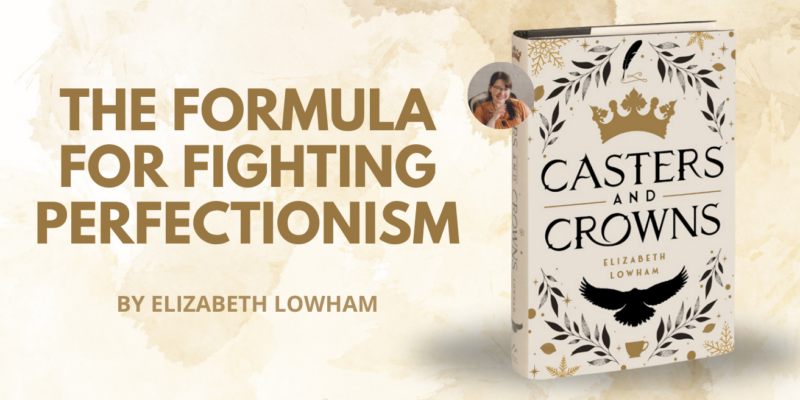
By Elizabeth Lowham, Author of Casters and Crowns
While serving a volunteer church mission in Hong Kong, I had a well-meaning companion tell me, “I’m so impressed by your diligence!”
To set the stage, we had stayed too late at an appointment, and as missionaries, we had a strict curfew. In order to keep curfew, we had to run all the way back to our apartment—a distance of, perhaps, two or three miles. My companion was just shy of six feet tall and an experienced cross-country runner. Me? Barely five feet with my shoes on, and, to quote a favorite Parks and Recreation character, “Jogging is the worst! I know it keeps you healthy, but . . . at what cost?”
Nevertheless, I did my very best to keep pace with a lovely jogging giraffe, and she gave me encouragement all the way, and we made it back to our apartment. With a big, beaming smile, my companion said, “I’m so impressed by your diligence! You’re not a runner, but you kept running!”
I was still fighting hard to catch my breath, which felt like it would never return, so I didn’t have the chance to take that in when she said it. We just resumed our regular missionary schedule—planning and preparation and prayers—and it wasn’t until I was lying in bed in the dark that I finally had a moment to think.
In that moment, I thought bitterly, “I’m not diligent.”
I wasn’t trying to put myself down, and I’m not incapable of taking a compliment. I could also see where my companion was coming from, and I thought she was sweet for seeing the best in me. She simply didn’t have the full context.
The full context was this: When we exited our appointment and I saw that we were going to be late for curfew, which would mean breaking a rule—failing, in other words—I was paralyzed at the thought of that failure. When I kept running, it wasn’t out of diligence, which would have just meant giving a persistent effort to do my best. It was out of perfectionism. I could not break a rule. I couldn’t bear the thought.
So I ran to the point my vision was overtaken with black and I couldn’t see. Had we not arrived home the minute we did, I likely would have collapsed. It wasn’t that I chose to keep running even when it was hard; I didn’t see it as a choice at all. I would have kept running to the point I put myself in the hospital as long as there were still seconds on the clock separating me from failure.
That’s not diligent. That’s unhealthy.
In her book Bird by Bird: Some Instructions on Writing and Life, Anne Lamott says, “I think perfectionism is based on the obsessive belief that if you run carefully enough, hitting each stepping-stone just right, you won’t have to die. The truth is that you will die anyway and that a lot of people who aren’t even looking at their feet are going to do a whole lot better than you, and have a lot more fun while they’re doing it.”
The death she’s speaking of can be either literal or metaphorical. To the perfectionist, failure feels like death. Why? I wish I knew. No one is judging me but me—at least, I can guarantee no one is judging me as harshly as me.
My young-adult and adult life has been plagued with PTSD and other mental health challenges, and one manifestation of that is perfectionism. I feel a deep, driving need to be perfect, because if I can do everything just right—as Anne says, if I can run carefully enough and hit each stepping-stone just right—then I will be safe or happy or whatever other elusive state of peace I’m seeking and can’t grasp. If I can do things without flaw, I will protect myself and the people I love, even from death.
It’s silly when put into words like that, but perfectionism is not subject to logic. It’s an emotional drive. Oftentimes you don’t even notice how severely it’s crept up on you until you’re lying in the dark wondering why you’re upset at being complimented for diligence.
So what can we do? It’s simple enough to say, “Stop running so carefully! Stop looking at your feet! Focus on the fun and allow yourself to make mistakes and forget about being perfect!”
That’s logical, yes. Does that work? No. Didn’t you read that part about how perfectionism is not subject to logic?
I don’t have all the answers, but I have one. At least, one that has helped me.
First, we have to understand perfectionism. Perfectionism is focused only on results, not on process. It is getting every answer right on a test, always arriving on time, remembering every task on a to-do list. It is a supreme competence that says we can be dropped in any situation and always land on our feet because we never need multiple attempts to get it right, we never need training or advice to learn, and so on. It is unreasonable and impossible, and one of the foundational problems with perfectionism is that we demand of ourselves supreme competence as if it’s the most important trait anyone could have.
It isn’t. Not that competence is worthless—it’s certainly helpful to life if you can pass tests and arrive on time and get tasks done. But if we’re grading things on a scale of 0-100, I think competence deserves a score around 80. It’s very helpful, but it’s not everything. What’s more important?
Compassion.
In my opinion, if we could assign a grading value to the importance of compassion, it would be 100. Compassion can completely change a life. Compassion with yourself allows you to transform failure into success, to grow even when things are difficult, to reframe crushing difficulties into manageable challenges. Compassion with yourself allows you to rest when you need it, to appreciate life, to love the person in the mirror. And when you begin from a foundation of love and acceptance for yourself, you can turn that outward. Compassion for others allows you to be a genuine friend and leader, to bolster people when they need it and to cheer them on without envy in success. Compassion for others allows you to understand difficult stances, to have patience with troublesome personality traits, and to mend broken relationships.
People—not competence, not accomplishments—are the most important part of life. That includes you. That includes me. Perfectionism values competency; you are only as good as your performance. Compassion values people; you are as good as you treat yourself and others. The most important thing we can ever be is compassionate.
In Bird by Bird,Anne Lamott also wrote, “Awareness is learning to keep yourself company. And then learn to be more compassionate company, as if you were somebody you are fond of and wish to encourage.”
Sometimes it is much easier to be fond of and encouraging to other people rather than ourselves. Perfectionism will keep us focused on our failures and shortcomings, our perceived worthlessness, our discouragement about continually falling short of something that was impossible from the start. It’s a depressing spiral. But if we can move the focus to compassion, if we can appreciate our good desires and heartfelt attempts, regardless of outcome, we can exit the spiral.
This doesn’t happen overnight. For that reason, I would say a trait almost as important as compassion is patience. Patience also values people over outcomes. Patience says it’s okay to work at something, to keep trying, to need time. While perfectionism says, “You have to get this right now,” patience says, “You have space to work this out, no matter how difficult.”
And if your brain does what mine does and tells you there’s no letting go of the perfectionism because, no matter what, you still have to do the thing—take the test, make the curfew, write the book, whatever it is—then I’ll let you in on a secret I’ve learned.
It’s a formula to fight perfectionism:
Compassion + Patience = Competence
If you have compassion with yourself and others, and you have the patience to continue moving forward, then you’ll gain the competence. Whatever you need to do, you will do it. You’ll get better at timing the appointments so that you aren’t late (or you’ll get better at accepting that sometimes unexpected things happen in life, and one tardy does not make you a disobedient failure). You’ll learn the tasks at your new job or you’ll figure out how to manage the toddler tantrums or you’ll start communicating honestly with your spouse. You will figure it out, I promise. But only if you can give yourself the space and love to do so.
One last quote from wise mentor Anne Lamott: “Perfectionism is the voice of the oppressor, the enemy of the people. It will keep you cramped and insane your whole life.”
If you want to combat your enemy, try starting with compassion and patience.
Not long after my near-death perfectionist run, my companion presented me with the insane idea to hike a mountain. We would do this on our “day off,” when we didn’t have appointments to keep or any other responsibilities. There were no rules involved, and if we decided partway in that it wasn’t worth it, we could turn back at any time. It was simply a challenge she and the other missionaries in our district wanted to tackle.
My preference would have been to stay inside and read a book, but I loved my outdoorsy companion, so I said yes.

We spent hours climbing the endless staircase to heaven that is Lion Rock’s trail. I took breaks whenever I needed them and pictures whenever I wanted them. Our group of missionaries laughed together and goaded each other on, and, eventually, arrived at the top. After a six-mile hike, I looked down from the peak of a mountain at all of Hong Kong sprawled below, with its beautiful skyscrapers and sparkling harbor, and I didn’t understand how I barely felt winded. It was like I was a completely different person from the girl who’d run home that one night.


I was. There was no desperation clawing at me to be unhealthy, no perfectionism demanding I meet a certain standard or die. I’d done something the right way—for the sake of someone I loved, for the enjoyment, for the challenge, with all the right tools and a diligent approach. I’d had compassion and patience with myself all the way, and with it, I’d achieved competence in something I never expected. I climbed a mountain.
Literal and metaphorical.
When I wrote Casters and Crowns, I dedicated it to my fellow perfectionists, like the main character, Aria, because I know firsthand that this climb is not easy. Trying to overcome this enemy takes a monumental struggle. But you are not alone. Have compassion with yourself and just keep trying.
We’ve got this.
NEW! Casters and Crowns: Cursed by magic, bound by mistakes, Princess Aria’s destiny hinges on the mysterious Baron Reeves. Will love be enough to break the curse, or will war bring her kingdom to ruin? A new romantasy by Elizabeth Lowham.

Elizabeth Lowham dreams of a future house that is seventy-percent library with at least three lavish window seats. Her reality is five bookshelves and a rocking chair, which isn’t so bad. Apart from reading and writing, her hobbies include sewing, sketching, dancing, eating, and other -ing verbs. Plus yoga. She has a bachelor of arts in English and works as an author, editor, and solicited screenwriter. She is a sexual abuse survivor who believes stories have a unique power to lift and heal for author and reader alike. She lives with her husband and son in the Loveland area of Colorado.